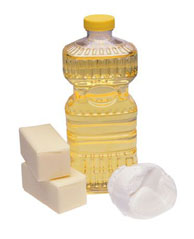- Body
- Fitness
- Nutrition
- Illness &
disability-

- Types of illnesses and disabilities
- Dealing with medical issues
- Coping with your feelings
- Taking care of your body
- Dealing with school
- Relationships
- Becoming independent
- For friends and family
- Stories, celebrities, chats, and other fun stuff
-
Quiz: How much do you know about taking good care of yourself?
-
-
Links to more information
-
-
- Drugs, alcohol
& smoking - Your
feelings - Relationships
- Bullying
- Safety
- Your
future - Environmental
health
Skip section navigation (navigation may have changed)
Section navigation

http://www.girlshealth.gov/
Nutrition
Fats

Fat sounds like something that you shouldn't eat. But your body needs some fat to grow and work well. Your body uses fats to make substances that it needs. Also, like carbohydrates, fat is a source of energy.
There are three major types of fat in food:
- Unsaturated (uhn-SACH-uh-ray-tid) fats are found in olive oil, peanut oil, canola oil, nuts, and avocados. "Fatty" fish — such as salmon, herring, and mackerel — are also a source of unsaturated fats.
- Saturated fats are found in red meats (such as beef, pork, and lamb) and animal products (such as butter, cheese, and all milk except skim). Saturated fats are also in palm and coconut oils. These oils are often used in ready-made cakes and cookies, as well as crackers.
- Trans fats are found in stick margarine and in fried foods, such as doughnuts and french fries. Like saturated fats, trans fats are often found in ready-made cakes and cookies, as well as crackers. When you see the words "hydrogenated" (heye-DROJ-uh-nay-tid) or "partially hydrogenated" in the ingredients list on the package, it means that the food contains trans fats.
Saturated and trans fats increase your risk of heart disease, stroke, and perhaps other diseases. To help prevent these diseases, most of the fats you eat should be unsaturated. But even with unsaturated fats, you should only eat them in moderate amounts. Eating too much of any type of fat can cause you to gain too much weight. And being overweight or obese can also cause health problems.
Content last updated September 22, 2009





